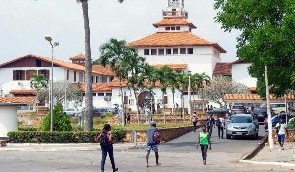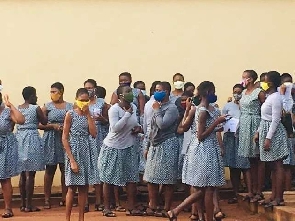Title: Tales From Different Tails
Author: Nana Awere Damoah
Pages: 145
Available: All leading bookshops
Review by: Dr Frankie Asare-Donkoh
The rhyming title of this book does not disappoint the reader as the book has a long
tail of tales that keeps the reader in different moods – sadness, laughter,
confusion and in suspense. As a young man growing up in a rural community, books by
great authors like Ama Atta Aidoo, Chinua Achibe, Atukwei Okai, Ayikwei Armah and
others were my immediate companions as they led me to understand the use of
language, especially spicing sentences with African proverbs.
Then there was the famous Baffour column in the then Weekly Spectator (now The
Spectator) written by my very senior colleague, the witty and humorous writer,
Willie Donkor, who enlivened my interest in reading.
With the Ama Aidoos, the Atukwei Okais and Chinua Achibes gradually fading away
through natural progression of humans, one wonders in whose hands they are leaving
readers of African-centred and authored novels. However, with young authors like
Nana Awere Damoah emerging unto the scene carrying the trademarks of our revered and
cherished authors named above, one is confident that the African story-telling
tradition is being sustained.
Usually, one would not expect chemical engineers to have much interest in novel
writing, to an extent of coming out with world-class novels. But Awere Damoah, a
Chemical Engineer with a Bachelor’s and Master’s degrees in Chemical Engineering
from Kwame Nkrumah University of Science and Technology (KNUST) and the University
of Nottingham, UK, proves such views wrong with his own style of exciting, inciting
and invigorating story- telling in the traditional African way.
Author of two previous books, Excursions in My Mind(2008) andThrough the Gates of
Thought (2010), Awere Damoah indeed shows that he indeed has a long tail of tales to
share with his readers. His third and current book, Tales from Different tails,
takes readers through some of the everyday life situations most people go through in
Ghana and other parts of Africa.
The book’s opening chapter, ‘October Rush’ set at the campus of the KNUST, Kumasi,
brings long-held memories by many who were privileged to be boarding students in
secondary schools and tertiary institutions. It’s a mixture of religiosity and
secularity, a situation very common in most university and college campuses where
the most religious and non-adherents struggle to win each other over. It’s also
about a love encounter between people who in their inner parts had fallen for one
another of the opposite sex but cannot show their true inner feelings because they
operate behind the curtains of the Scriptures Union (SU), which sometimes bluntly
considers even the mere talk about ‘love and romance’ as sin.
‘October Rush’ thus keeps the reader captivated right from the beginning to the end
and would not make one put the book down. Perhaps, what might intrigue a lot of
readers of this book who know the religious background of Nana Awere Damoah, and his
deep involvement in the SU, is how he classically categorises the girls on campus
into ‘New Stock’ (freshers), ‘Reduced to Clear’ (sophomores), and ‘Buy One, Get One
Free’ (final years), indicating how ‘fresh’ or ‘expired’ a girl could be depending
on the length of her ‘operations’ on campus. The suspense in this opening chapter is
superb.
The other chapters of the book are cleverly shared to cover different life
experiences which many of us go through. They range from pure and unadulterated love
to unbelievable betrayal of friendship and loyalty. ‘Truth Floats’, ‘Dribble
Zagidibodidi’ and ‘Hope Undeferred’ (Chapters 2, 3 and 4) clearly display different
levels of love, loyalty and jealousy and how sometimes jealousy could drive some
people to send their friends to jail in order to have their girlfriends, wives,
husbands, properties and positions in life. The happy endings of some of these
stories, particularly that of chapter three, brings out Awere Damoah’s story-telling
skills.
Chapters 5 and 6, provide a lot of lessons for many a young man and woman embarking
on life’s journey. Kojo Nkrabeah’s move from the village to the city to take his
share of the flowing gold and wealth on the streets provides a good warning to those
who are easily swayed by the sudden transformation of their friends’ poor lives
without pondering over the source of their wealth. ‘Guardian of the Rented Well’
(chapter 6) is about how both men and women would trade sex to achieve their goals,
and how they are eventually shamed and punished.
The ‘Trotro Palaver’ (chapter 7) captures the usual scenes within trotros (most
popular transport in Ghana) and taxis where debates, gossips and all sorts of
discussions take place, sometimes leading to some passengers engaging themselves in
hot exchanges in favour of their preferred political parties and leaders. The
chapter also reveals the behaviours of some drivers and their mates (aplanke) and
how they treat passengers.
The other fascination about this book is how Nana Awere Damoah establishes himself
as a good African story-teller by interspersing his narrations with proverbs,
bringing my memories of Baffour and his usual antics with his numerous friends at
their palm wine bars. “…the offspring of the long snake could not be short” is how
Awere Damoah rebrands the old Ghanaian proverb of “Okoto nwo anoma” (a crab can’t
give birth to a bird) on page 52 of the book.
In order not to let you drink your soup before the fufu is brought, all I can do is
to leave you, dear reader, to enjoy the re-birth of African story-telling by going
for a copy of this fascinating and easy to read book which is on sale at all leading
bookshops in Ghana and also on Amazon and other internet bookshops.
About the Reviewer
Dr. Frankie Asare-Donkoh is a Media and Governance Consultant, and Lecturer in
Political Science at the Department of History and Political Studies of the Faculty
of Social Sciences, Kwame Nkrumah University of Science and Technology, Kumasi,
Ghana. Dr Asare-Donkoh has been a journalist, columnist and newspaper editor for
over 15 years, publishing over 400 newspaper articles since he began. In 1995, he
won the Best News Reporter award in Ghana. Frankie was the acting General Secretary
and Deputy General Secretary of Ghana Journalists Association for four years.
Footnote: Tales from Different Tails will be launched on 1 December 2011 at the
Teachers' Hall Complex, Adabraka, Accra at 6pm.
Opinions of Monday, 28 November 2011
Columnist: Damoah, Nana Awere














